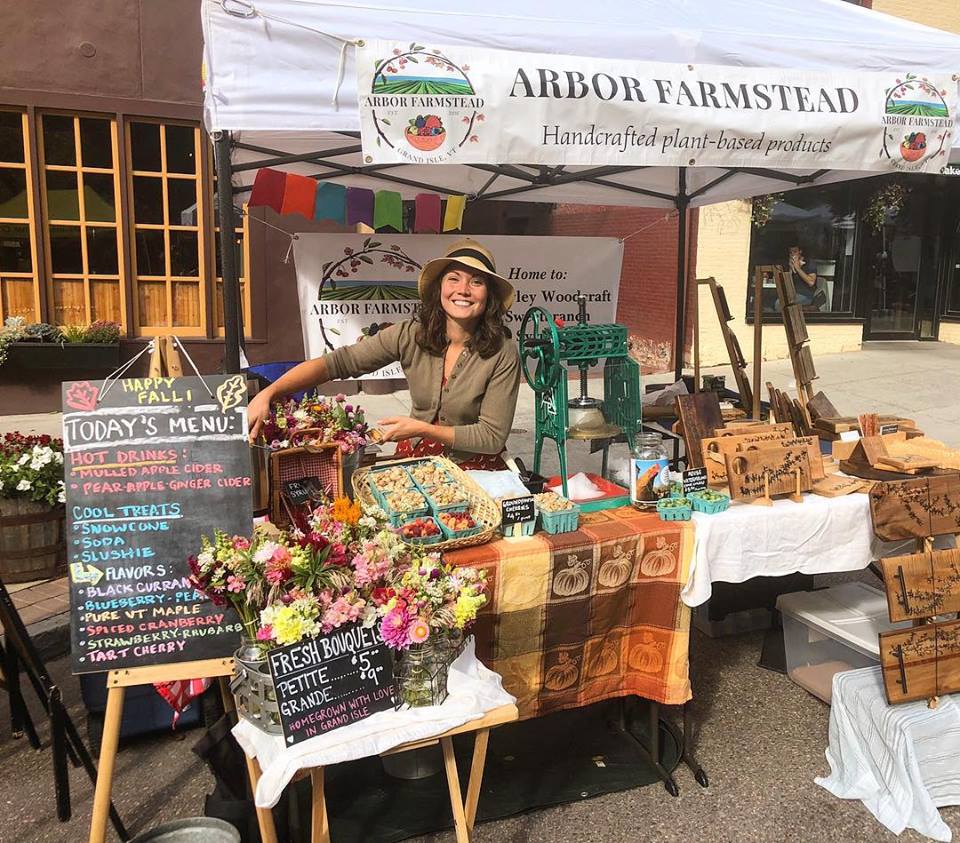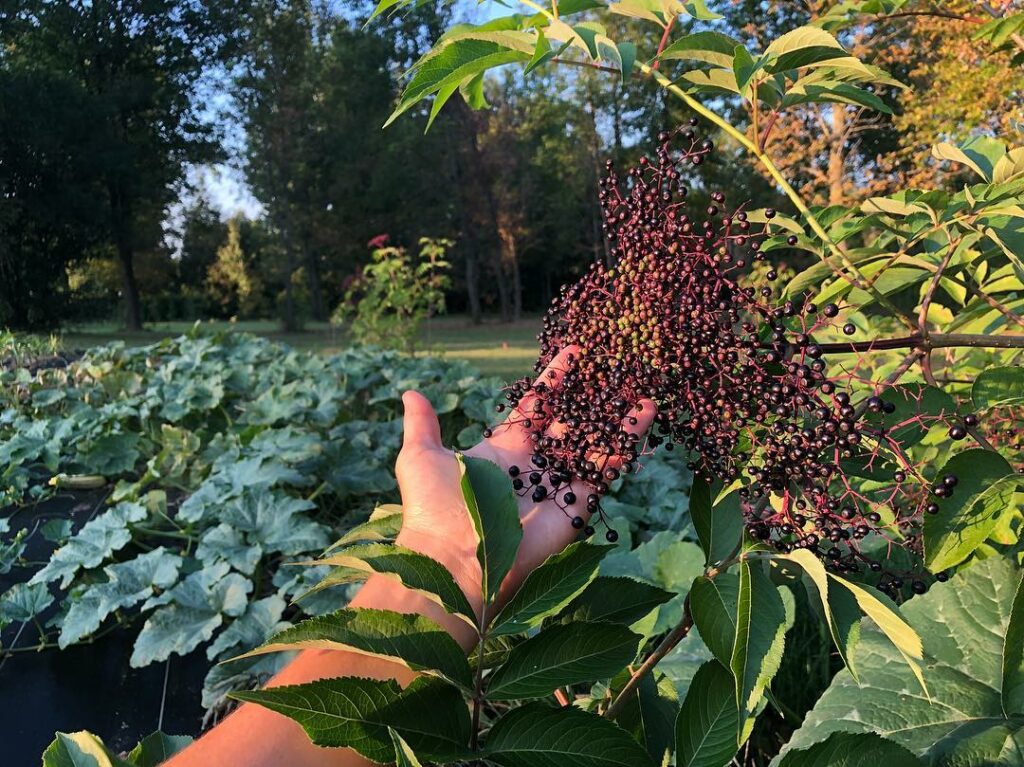In 2016, Alisha Utter launched Arbor Farmstead in the Champlain Islands with her partner, Kyle Bowley. Arbor Farmstead focuses on plant-based agriculture, following the practices of “veganic” farming which builds on organic practices but eschews all animal products/byproducts from fish meal to animal manure. A diverse mix of plants and practices, flexibility in responding to customers, and strategic planning in balancing farm and off-farm work, all work together to help Alisha and Kyle build their farm’s resilience to production, market, financial and human risks.

When Alisha and Kyle started looking for a place to set down farming roots, they cast their net wide around Vermont. In Belvidere, they found 60 acres they loved but were concerned about distance to off-farm job opportunities and markets for their products. The couple traded acreage for proximity to Burlington, eventually taking out a 30-year mortgage on seven acres with a house and space for Kyle’s woodshop in Grand Isle.
The mix of plants and practices is evolving on their three acres of cleared land towards a fully regenerative, perennial-focused agriculture system with a mix of berries like currants, gooseberries, elderberries and aronia. Last year, they added 40 peach and sour cherry trees. One high tunnel, funded through NRCS EQIP, protects fall raspberries and they will be adding a second high tunnel for additional fruit production this spring. Having completed UVM’s Farmer Training Program in 2014, Alisha is now finishing a Ph.D. in UVM’s department of Plant and Soil Science, and her dissertation focuses on plant-based agriculture.
Community and Mentors
In 2015, Alisha first began leasing land for vegetable production from Allenholm Farm and sold produce through the on-site farm stand and Champlain Islands Farmers’ Market (CIFM). The next year, when Alisha and Kyle acquired long-term land access in Grand Isle, they established Arbor Farmstead and transitioned to perennial crops. Today, Arbor Farmstead offers fresh fruit, bottled fruit syrups, ready-to-eat fruit syrup snowcones, sodas, and slushies, as well as Kyle’s wood products. In addition to online sales, they currently vend at both the summer/winter CIFM and Burlington Farmers’ Market. Alisha prefers selling direct to consumers, but recognizes that it’s not the most efficient way to build a business. Future plans might include establishing a farmstand with aggregated products from other farms to cater to summer Champlain Islands residents.
Kyle and Alisha are interested in expanding and have explored acquiring more land. The couple is continuing to work on expanding their acreage, potentially through a partnership with the Vermont Land Trust.
However, they’ve found local lending institutions are skeptical that revenue streams will cover loan payments, especially when Alisha explains, “I sell snow cones for a living and that will pay the mortgage.” While Alisha has always worked multiple jobs and squirreled away savings, she is frank about the fact that it was Kyle’s credit history and job as a U.S. Army helicopter pilot that secured them their original mortgage approval.

“Diversity is our Risk Management”
The couple is still figuring out their best mix of plants, techniques and markets to maximize the land they currently have—and minimize risk. “I’d call us ‘risk-aware,’” Alisha says. They use Google docs to track their business finances and crop management. This past semester, Alisha had to choose between covering her final doctorate course credits and continuing her student health insurance. She chose the course credits and is pursuing insurance coverage through VT Health Connect as she recognizes that health insurance remains a substantial challenge for farmers.
Alisha is passionate about agroecology, which she describes as a science, a practice and a movement. “To me, it’s about looking at a farm as an ecosystem that extends to the local community and even the larger global community. It also promotes sustainable and resilient farmer livelihoods.”
Not everything grown at Arbor Farmstead fits the bigger vision, but Alisha understands that compromise is critical. “If business wasn’t part of it, I probably wouldn’t grow strawberries or raspberries,” she says. “But if we said no strawberries or raspberries, how would we be a community business?” She balances it out by planting crops like goji berries between the more common fruits.
A flexible outlook has also helped Arbor Farmstead respond to unexpected opportunities. Her original intention for growing flowers was to provide a continuous source of food for pollinators. However, when customers began asking to buy the bouquets they brought to market to decorate the stand, she responded by making it a point to include bouquets within their weekly market offerings.
“Growing many different crops is a form of insurance.”
Traditional crop insurance plans are not well-suited to farms like Arbor Farmstead, Alisha says. “Growing many different crops is a form of insurance. Diversity is our risk management,” she says. Kyle’s job in the army is both a support and a risk to the farming business because his schedule can involve being away for a couple months for training. “We need to develop systems that can be done by one person,” she says, like a solo approach to clearing snow from the high tunnels. The high tunnels themselves are also a way to increase the farm’s resilience to severe weather and extend their growing season.
Alisha continues to work off-farm as she completes her dissertation on veganic agriculture. Her goal is to move towards a land-based livelihood, but she appreciates that her work in restaurants broadens her perspective: “It helps me to be engaged with what consumers want, what chefs want, what our neighbors want,” she says. Alisha also feels strongly about being an ambassador, broadly for young farmers, agroecology, and veganic farming. She presently serves on the following boards: Vermont Young Farmers Coalition; Vermont Vegetable and Berry Growers Association; and Champlain Islands’ Farmers Market. Alisha was also recently appointed to the Vermont Working Lands Enterprise board.
Her advice to other new farmers is to plan and develop systems, “but at the end of the day, recognize that you’re going to have to co-evolve and adapt.” Finally, Alisha urges: “Make time for self-care.” During the height of the season, she tries to take breaks to forage mushrooms, hike or take the dogs swimming. “It allows me to step back for a moment,” she says.






